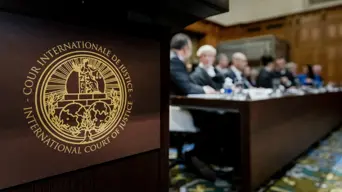UN members seek ICJ opinion on Israel aid obligations to Palestinians
The resolution seeking the advisory opinion from the UN's top court was brought by Norway, and co-sponsored by Egypt, Jordan, Qatar and Saudi Arabia, among others.

This general view shows the logo of the International Court of Justice (ICJ) in The Hague on 12 January 2024, prior to the hearing of the genocide case against Israel, brought by South Africa. Picture: Remko de Waal / ANP / AFP
UNITED NATIONS - The UN General Assembly overwhelmingly approved a resolution on Thursday asking the International Court of Justice (ICJ) to assess Israel's obligations to assist Palestinians, amid accusations the Israeli government systematically hinders Gaza aid.
Israel, which has tightly restricted aid going into the Hamas-ruled territory since the outbreak of the war, often blames the inability of relief organizations to handle and distribute large quantities of aid for the dire humanitarian situation.
Despite serious international concerns, Israeli lawmakers have passed laws to bar the UN's Palestinian aid agency, UNRWA, from operating in Israel and east Jerusalem, while raising the prospect of similar measures against other aid agencies.
The UN's full membership voted to request an ICJ advisory opinion which, though not binding, can serve to heighten pressure on countries - as happened in July when it said Israel's occupation of Palestinian territory was "illegal" and needed to end.
The resolution seeking the advisory opinion from the UN's top court was brought by Norway, and co-sponsored by Egypt, Jordan, Qatar and Saudi Arabia, among others. It won backing from 137 countries, while 12 objected, and 22 abstained.
The ICJ will be asked to consider what Israel is obliged to do to "ensure and facilitate the unhindered provision of urgently needed supplies essential to the survival of the Palestinian civilian population."
"It is just a catastrophe that the international community has not been able to respond adequately," Norway's deputy foreign minister Andreas Kravik told AFP, claiming Israel "has just not been collaborating with the UN... but also with other NGOs."
"There is not a lack of willingness on the part of the international community to provide humanitarian assistance, but we're just not getting access, and we're not getting the collaboration we need in order to be effective," he said.
AID SYSTEM 'WEAPONISED'
For more than seven decades, UNRWA has provided critical support to Palestinian refugees.
The agency has faced criticism from Israeli officials that has escalated since the start of the war in Gaza, which was unleashed after Hamas's 7 October 2023, attack.
The attack resulted in the deaths of 1,208 people, mostly civilians, according to an AFP tally of Israeli official figures.
In response, Israel launched a withering assault on Gaza that has killed at least 45,129 people, also mostly civilians, according to Hamas-run health ministry figures that the United Nations considers reliable.
The assault has also reduced much of the Palestinian enclave to rubble, leaving 1.9 million people - or about 90 percent of the population - displaced, according to the United Nations. Most rely on humanitarian aid to survive, UNRWA says.
Israel claims that a dozen UNRWA employees were involved in the deadly assault.
A series of probes found some "neutrality related issues" at UNRWA, and determined that nine employees "may have been involved" in the 7 October attack, but found no evidence for Israel's central allegations.
"It looks like the aid system has been weaponised, and as a result of this, what we can provide to people is only a fraction of what they truly need," said Georgios Petropoulos, head of the UN's humanitarian agency's Gaza office.
"Every day, as an aid worker in Gaza, you're forced to make horrible decisions."
Norway angered Israel in May when it recognized the Palestinian state, together with Ireland and Spain.
Unlike other donors, it increased its aid to UNRWA in June despite the controversy over whether the agency's employees were involved in the 7 October attack.
"This is not in any way an anti-Israel measure. This is a pro-humanitarian principles measure that we're taking," Kravik said, adding: "We have nothing against Israel."
Israel's UN ambassador Danny Danon said "this assembly refuses to move forward."
"The ICJ now has been weaponised... its advisory opinions undermined to attack Israel," he said, calling the process an "endless loop of bias."